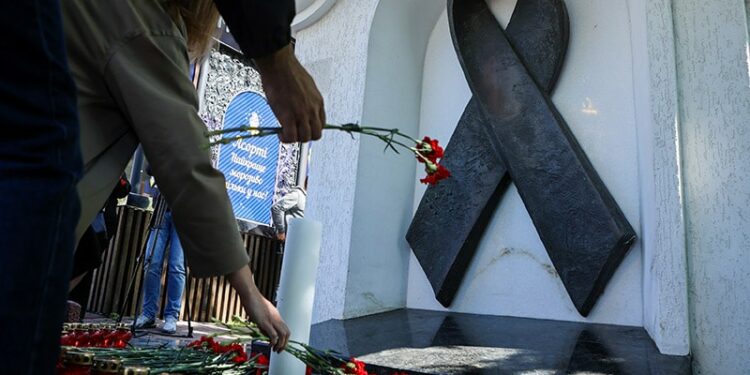[ad_1]
The future of Ukraine’s HIV response could be in jeopardy following the US President’s executive order to freeze foreign aid for 90 days, with a few exceptions.
On January 20, the Trump administration ordered a stop work for all global health funding. This included the US President’s Emergency Plan for AIDS Relief (PEPFAR), a US $7.5 billion program that has provided lifesaving treatment for more than 20 million people worldwide, in addition to funding test kits and preventive medicine supplies for millions more.
On January 29, however, Secretary of State Marco Rubio issued an “Emergency Humanitarian Waiver” that approved the continuation or resumption of lifesaving medicines and medical devices, which will allow people to continue accessing HIV treatment funded by the United States across 55 countries, including Ukraine. Two thirds of all people living with HIV receiving treatment globally are directly supported by PEPFAR; the program is credited with saving 25 million lives since it launched in 2003.
Whether the waiver will be extended to other vital elements of the HIV response, such as HIV testing, prevention, and education, remains unknown.
“We’re all trying to understand the scope of this waiver and what it includes — and, importantly, what it does not. PEPFAR has not confirmed details yet, and I suspect that’s what they are working through now,” said Jirair Ratevosian, DrPH, a former senior advisor to PEPFAR. He is currently an associate research scientist at Yale University with a primary focus on HIV prevention.
He added, “What worries me is that the waiver appears to be very narrow, meaning the foreign aid freeze would still apply to over 50% of the PEPFAR program. This could impact critical HIV prevention services, such as voluntary medical male circumcision, PrEP [pre-exposure prophylaxis] drugs, HIV testing, and a range of other essential services for key populations. It also seems to exclude care and support for millions of orphans, vulnerable children, and their caregivers. If that is the case, the implications for the HIV response and the millions who depend on it will be significant.”
Ukraine has an estimated 245,000 people living with HIV, the second highest incidence in Europe after Russia. A 2024 UNAIDS report found that the number of new HIV infections in Eastern Europe and Central Asia increased by 20% between 2010 and 2023.
The increase in new HIV infections has been partly attributed to the war in Ukraine. The report noted that the growing HIV epidemic called for the prioritization of “expanded prevention and treatment coverage” and “HIV sustainability plans and actions.”
On-the-Ground Impacts
Oksana Kyrychok is the program director of 100% Life, the largest HIV patient organization in the region, which has been at the forefront of the HIV response for more than 20 years. It has an office in every region in Ukraine and works directly with patients in territories controlled by the Ukrainian government, allowing it to deliver HIV testing, support, connection to health facilities, and adherence help for people living with HIV, including the prison population.
Kyrychok said her understanding is that the Trump administration has only unfrozen the release of funding for antiretroviral therapies, but the foreign aid freeze continues to encompass other HIV activities.
She explained that 100% Life had been forced to suspend their testing and treatment support programs along with their telephone hotline for patients, which will “lead to a decrease in patient awareness of HIV treatment and prevention.” Moreover, the head office estimates it may need to let go of 25% of their staff, while regional branches of the organization anticipate having to let go of their social workers if they can’t pay them. The organization has launched an emergency fundraising campaign to address these issues.
Andrew Hill, MD, PhD, senior visiting research fellow in the Department of Pharmacology and Therapeutics at the University of Liverpool, Liverpool, England, told Medscape Medical News that only treating people wasn’t enough to halt the HIV epidemic. The aid freeze “should never have happened,” he said. “There’s a big HIV epidemic in Ukraine and they are dependent on support.”

Andriy Klepikov, PhD, executive director of the Alliance for Public Health, one of the largest HIV-focused NGOs in Ukraine and the wider region, told Medscape Medical News that 118,000 patients in Ukraine are currently receiving antiretroviral therapy with the support of PEPFAR. He added that a United States Agency for International Development–funded program in Zaporizhzhia close to the war’s frontline, which provides integrated mobile health services for HIV, tuberculosis, and hepatitis in an area where there are no clinics or doctors, has been stopped. “We’re currently looking for alternative funding for this,” he said.
Understanding the full scope of the situation, not only in Ukraine but also in all countries supported by PEPFAR, is challenging, given the current lack of details. But, in a country going into its fourth year of war, it is evident that a temporary freeze of support of any size — or possible permanent withdrawal of funding — will further undermine the country’s health system and possibly derail Ukraine’s efforts to tackle HIV.
“What is actually going on? We’re operating in an information vacuum, and it’s difficult to get a read on the situation because people are simply not allowed to speak,” Hill said. “People at PEPFAR have a gag order. The number of people who could die as a result of this is just staggering.”
[ad_2]
Source link : https://www.medscape.com/viewarticle/ukraines-hiv-response-may-falter-pause-us-funding-2025a10002le?src=rss
Author :
Publish date : 2025-02-03 09:46:43
Copyright for syndicated content belongs to the linked Source.














